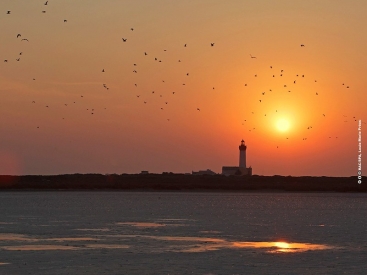Search
04/20: The MedFund grants 1.8 million euros for the benefit of marine protected areas in Albania and Tunisia
This financial support comes to reinforce and complement UNEP/MAP-SPA/RAC's initiatives for marine protected areas, in particular those classified as Specially Protected Areas of Mediterranean Importance (SPAMIs).
A SPAMI, or a Specially Protected Area of Mediterranean Importance, is a site which is of importance for conserving the components of biological diversity in the Mediterranean; contains ecosystems specific to the Mediterranean area or the habitats of endangered species; is of special interest at the scientific, aesthetic, cultural or educational levels. The SPAMI List was established within the framework of the Barcelona Convention for the Protection of the Mediterranean Sea and its SPA/BD Protocol to promote cooperation in the management and conservation of natural areas, as well as in the protection of threatened species and their habitats.
The SPAMIs are therefore a heritage that the Mediterranean countries are committed to preserve in an exemplary way. It happens for various reasons, especially financial, that the management of the Marine Protected Area (MPA) is not effective. A 2016 study shows that less than 10 % of the budget needed for the conservation of the marine environment is made available to MPAs in the Mediterranean. Yet effective management requires functional and sustainable financial mechanisms, which The MedFund is committed to put in place in a spirit of cooperation between the countries of the Mediterranean.
The MedFund's technical and financial support comes to reinforce and complement UNEP/MAP-SPA/RAC's initiatives to help national authorities in the management of MPAs and to encourage collaboration between governmental institutions and civil society. Some of UNEP/MAP-SPA/RAC's most recent projects in this field include the SPAMI Twinning Programme (exchange of good management practices between SPAMIs), the Kuriat project (support for the implementation of the management plan), and the IMAP-MPA project (MPA development and integration of the ecosystem approach).
On March 24th, the Board of Directors of The MedFund approved the funding of 1.8 million euros for MPAs and SPAMIs in Albania and Tunisia for the next 5 years. This funding will support one future MPA in Tunisia (Kuriat Islands), one newly declared SPAMI in Albania (Karaburun Sazan) and 3 others included in a "period of provisional nature" following the decision of the Contracting Parties to the Barcelona Convention at their COP 21 (La Galite Archipelago, Kneiss Islands, and Zembra and Zembretta); the latter being Tunisian SPAMIs. The willingness to financially assist SPAMIs in difficulty through The Medfund was expressed during the Barcelona Convention COP 21 and welcomed by the latter.
It should be recalled that SPA/RAC through its Director, Mr. Khalil Attia, is member of the Board of Directors of The MedFund and was one of the founders of this initiative.
The following is an overview of upcoming projects in the five beneficiary MPAs/SPAMIs:
Kuriat Islands, Tunisia – a future MPA
The funding granted by The MedFund to APAL (Agence de Protection et d’Aménagement du Littoral) and the NGO Notre Grand Bleu aims in particular to improve the surveillance of the protected area in order to prevent infringements and to raise awareness among users and tourist operators on good practices to be followed in this fragile area.
Located 18 km off the coast of the city of Monastir, the Kuriat Islands are, inter alia, the principal nesting site in Tunisia for the loggerhead turtle, an endangered species in the Mediterranean.
La Galite Archipelago, Tunisia - SPAMI since 2001
The funding granted to APAL and the NGO MAN (Méditerranée Action Nature) will allow, notably, the implementation of scientific monitoring to assess and monitor the health of the ecosystems and the most vulnerable species of this archipelago.
The La Galite Archipelago is made up of 6 islands and islets, located 81 km away from the city of Bizerte. The rocky bottoms are home to emblematic species such as grouper, bottlenose dolphin and Posidonia.
Kneiss Islands, Tunisia - SPAMI since 2001
The MedFund grants funding to APAL and the NGO ACG (Association Continuité des Générations) in order to protect the numerous bird species and to collect the plastic waste unfortunately present on many islands.
The Islands are located in the Gulf of Gabès, 3.5 km far from the continent. Consisting of a mosaic of wetlands, they are home to up to 330,000 wintering birds.
Zembra and Zembretta, Tunisia - SPAMI since 2001
The funding granted by The MedFund to APAL and the NGO ASPEN (Association de Sauvegarde du Patrimoine Environnemental et Naturel) will encourage, inter-alia, the setting up of a management committee associating local actors, scientists and administrations in order to better preserve this exceptional site.
The archipelago is located in front of the Cap Bon peninsula. It is composed of the Island of Zembra surrounded by two rocks and the Islet of Zembretta. Zembra has a rugged coastline of 433 m above sea level with cliffs up to 50 m below sea level.
Karaburun Sazan, Albania - SPAMI since 2016
The funding provided by The MedFund to the local NGO Flag Pine, in association with the National Agency of Protected Areas (NAPA), will enable better monitoring of this large marine protected area and help combat illegal fishing activities.
Albania's only marine park consists in the Karaburun peninsula and the Island of Sazan, near the Bay of Vlora. It is home to no less than 36 globally threatened marine species, such as the Mediterranean monk seal.
Note: A forthcoming call for interest will be launched by The MedFund in June 2020 to support new marine protected areas in the Mediterranean. For more information, visit https://themedfund.org









Find Us On...